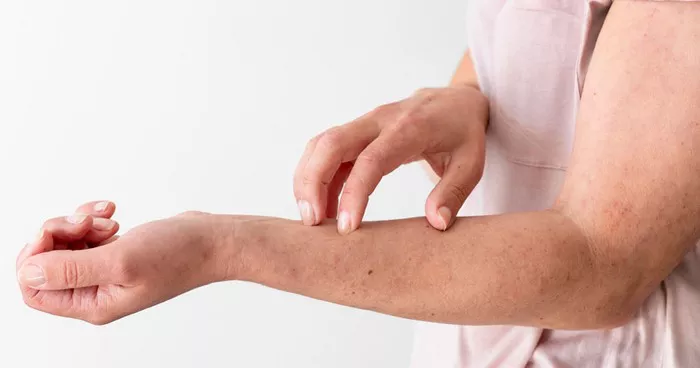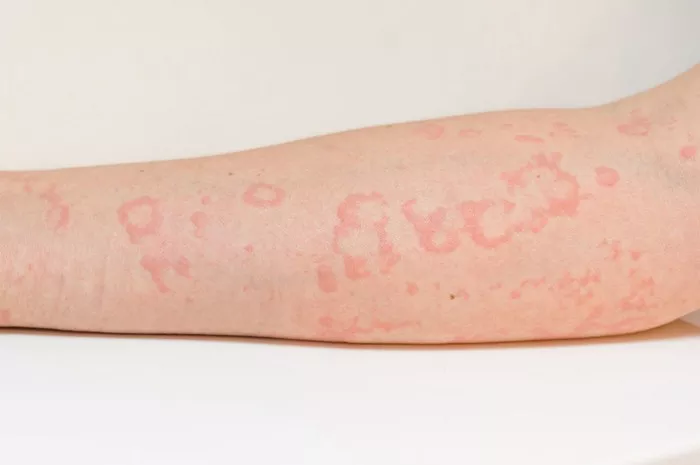Allergic reactions can manifest in various forms, ranging from mild itching to severe respiratory distress. Among the diverse symptoms that can arise, hives (urticaria) are a common occurrence. These raised, red welts on the skin can be uncomfortable and distressing, prompting individuals to seek relief. While there are numerous over-the-counter and prescription medications available to treat hives, it’s essential to understand what to put on hives to alleviate discomfort effectively.
Understanding Hives: Causes and Symptoms
Before delving into treatment options, it’s crucial to comprehend the underlying causes and symptoms of hives. Hives typically result from the body’s immune response to certain allergens or stimuli. Common triggers include:
1. Food Allergens: Foods such as nuts, shellfish, dairy, and eggs can provoke allergic reactions leading to hives.
2. Medications: Certain medications, including antibiotics and nonsteroidal anti-inflammatory drugs (NSAIDs), can trigger hives in susceptible individuals.
3. Insect Stings or Bites: Bee stings, ant bites, and other insect bites can cause localized or widespread hives.
4. Environmental Factors: Exposure to allergens like pollen, pet dander, or latex can induce hives in sensitive individuals.
5. Physical Stimuli: Temperature extremes, pressure on the skin (dermatographism), or sun exposure (solar urticaria) can also lead to hives.
Symptoms of hives typically include raised, itchy welts on the skin that may vary in size and shape. In some cases, hives may be accompanied by swelling (angioedema), which can affect the face, lips, tongue, or throat and may necessitate immediate medical attention due to the risk of airway obstruction.
Treatment Approaches for Hives
When faced with an outbreak of hives, individuals often seek quick relief from the itching and discomfort. Several treatment options are available to manage hives effectively:
1. Antihistamines:
Over-the-counter or prescription antihistamines are commonly used to relieve itching and reduce the severity of hives. These medications work by blocking the effects of histamine, a chemical released during allergic reactions. Non-sedating antihistamines such as loratadine (Claritin) or cetirizine (Zyrtec) are preferred during the day, while sedating antihistamines like diphenhydramine (Benadryl) may be used at night to alleviate itching and promote sleep.
2. Topical Treatments:
Calamine lotion, hydrocortisone cream, or menthol-based ointments can provide temporary relief from itching and soothe inflamed skin. These topical treatments can be applied directly to the affected areas as needed.
3. Cold Compresses:
Applying a cold compress or ice pack to the hives can help reduce inflammation and alleviate itching. Cold therapy constricts blood vessels, which can provide immediate relief from discomfort.
4. Avoidance of Triggers:
Identifying and avoiding triggers that provoke hives is essential for preventing recurrent outbreaks. Keeping a diary of symptoms and potential triggers can aid in pinpointing the underlying cause of hives and implementing necessary lifestyle changes.
5. Oral Corticosteroids:
In severe cases of hives that do not respond to other treatments, a short course of oral corticosteroids such as prednisone may be prescribed to reduce inflammation and suppress the immune response. However, long-term use of corticosteroids is generally avoided due to the risk of side effects.
Natural Remedies for Hives
In addition to conventional treatments, several natural remedies may offer relief from hives:
1. Oatmeal Baths:
Adding colloidal oatmeal to lukewarm bathwater can help soothe irritated skin and reduce itching associated with hives. Oatmeal has anti-inflammatory properties that can alleviate discomfort and promote healing.
2. Aloe Vera Gel:
The gel extracted from the leaves of the aloe vera plant has cooling and anti-inflammatory properties, making it beneficial for soothing inflamed skin caused by hives. Applying a thin layer of aloe vera gel to the affected areas can provide relief from itching and promote skin healing.
3. Baking Soda Paste:
Mixing baking soda with water to form a paste and applying it to hives can help reduce itching and inflammation. Baking soda has alkaline properties that can neutralize acids on the skin’s surface, providing temporary relief from discomfort.
4. Apple Cider Vinegar:
Diluted apple cider vinegar can be applied topically to hives to alleviate itching and reduce inflammation. Apple cider vinegar contains acetic acid, which has antimicrobial and anti-inflammatory properties that can help soothe irritated skin.
5. Herbal Supplements:
Certain herbal supplements, such as stinging nettle, quercetin, and bromelain, may have antihistamine and anti-inflammatory effects that can reduce the severity of hives. However, it’s essential to consult with a healthcare professional before using herbal remedies, as they may interact with medications or exacerbate underlying health conditions.
When to Seek Medical Attention
While most cases of hives can be managed effectively with over-the-counter treatments and home remedies, there are instances where medical attention is warranted:
1. Severe Symptoms:
If hives are accompanied by swelling of the face, lips, tongue, or throat (angioedema), or difficulty breathing, it’s essential to seek immediate medical attention, as these symptoms may indicate a severe allergic reaction known as anaphylaxis.
2. Persistent Hives:
If hives persist for more than a few days despite treatment with antihistamines or other remedies, or if they recur frequently, a healthcare professional should be consulted to rule out underlying medical conditions and determine the appropriate course of action.
3. Signs of Infection:
If hives become increasingly painful, tender, or oozing, or if there are signs of infection such as warmth, redness, or pus at the site of the hives, medical evaluation is necessary to prevent complications and initiate appropriate treatment.
Conclusion
Managing hives effectively involves identifying and avoiding triggers, using appropriate medications and topical treatments, and incorporating natural remedies to alleviate symptoms and promote skin healing. By understanding what to put on hives and when to seek medical attention, individuals can take proactive steps to mitigate discomfort and prevent complications associated with allergic reactions. It’s essential to work closely with healthcare professionals to develop a comprehensive treatment plan tailored to individual needs, ensuring optimal management of hives and improved quality of life.



























